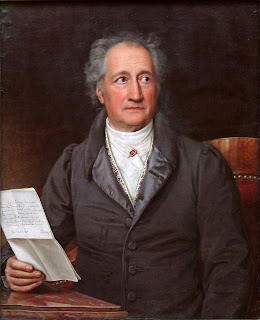What If We Viewed Goethe Like Shakespeare? Adam Kirsch's Transplant Counterfactual
In the current issue of The New Yorker, Adam
Kirsch offers a nice example of a “transplant counterfactual,” in discussing
the significance of the famed German poet and writer, Johann Wolfgang von Goethe.
This kind of counterfactual typically transplants a
particular figure from his or her own time into an earlier one in order to
determine how he or she would responded to different conditions. In this
instance, Kirsch shifts the counterfactual’s purpose somewhat to shed light on
how the individual would be viewed by posterity.
Kirsch seeks to get his English speaking readers to
appreciate the greatness of Goethe – a writer seldom actually read in the
Anglophone world – by comparing him counterfactually with the Anglophone world’s
acknowledged genius, William Shakespeare.
Kirsch writes:
“To get a sense of how Johann Wolfgang von Goethe
dominates German literature, we would have to imagine a Shakespeare known to
the last inch—a Shakespeare squared or cubed. Goethe’s significance is only
roughly indicated by the sheer scope of his collected works, which run to a
hundred and forty-three volumes. Here is a writer who produced not only some of
his language’s greatest plays but hundreds of major poems of all kinds—enough
to keep generations of composers supplied with texts for their songs. Now
consider that he also wrote three of the most influential novels in European
literature, and a series of classic memoirs documenting his childhood and his
travels, and essays on scientific subjects ranging from the theory of colors to
the morphology of plants.”
“Then, there are several volumes of his recorded
table talk, more than twenty thousand extant letters, and the reminiscences of
the many visitors who met him throughout his sixty-year career as one of Europe’s
most famous men. Finally, Goethe accomplished all this while simultaneously
working as a senior civil servant in the duchy of Weimar, where he was
responsible for everything from mining operations to casting actors in the
court theatre. If he hadn’t lived from 1749 to 1832, safely into the modern era
and the age of print, but had instead flourished when Shakespeare did, there
would certainly be scholars today theorizing that the life and work of half a
dozen men had been combined under Goethe’s name.”
In making this observation, Kirsch alludes to the
paucity of information about Shakespeare and the “persistence of conspiracy
theories attributing Shakespeare’s work to the Earl of Oxford or other
candidates.”
Would we be equally skeptical about Goethe’s genius
today had he lived several centuries earlier, before the dawn of the “age of
print?”
Perhaps.
Kirsch’s brief counterfactual reminds us that transplant counterfactuals
provide useful shifts in perspective that allow us to reassess and reevaluate
established truths.



Comments